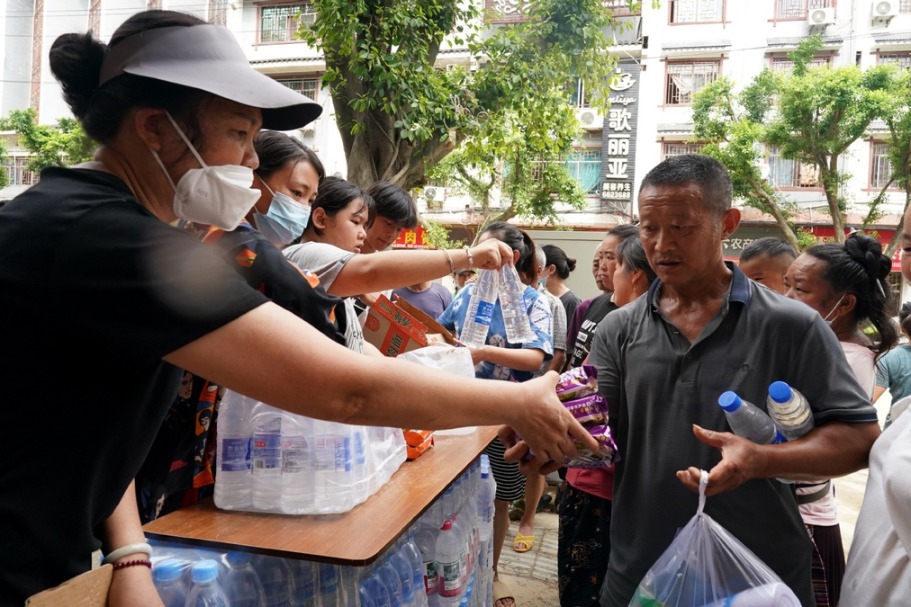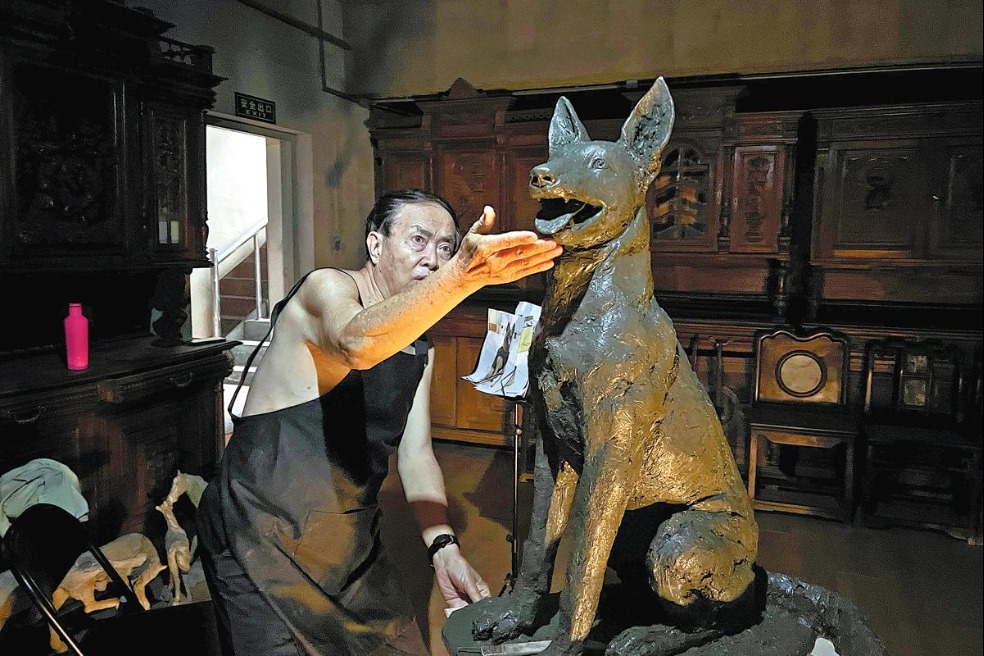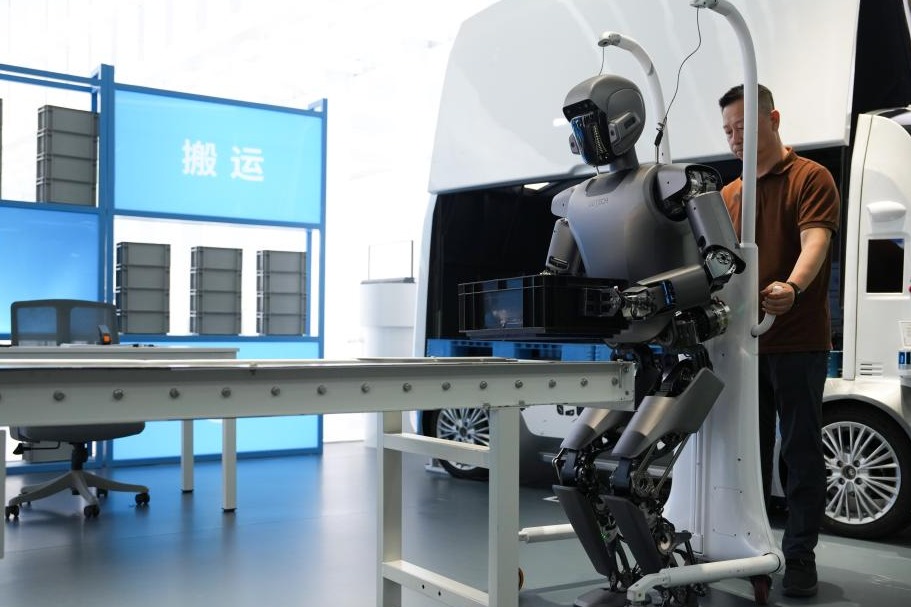NBA does a slam-dunk in China

More than 30 years ago, the National Basketball Association started playing games in China. Now the world's most populous country is its fastest-growing international market, MAY ZHOU reports from Houston.
The numbers tell the story.
On the National Basketball Association's official blog in China - http://e.weibo.com/nba - 27.5 million fans. On the league's website in China - NBA.com/China - 8.6 million registered fans. There are 70 million NBA followers on Sina Weibo, Tencent Weibo, Tencent Qzone and Tencent WeChat.
And the fan numbers have made China the No 1 international market for the NBA.
"Basketball and the NBA have never been more popular in China," said NBA China CEO David Shoemaker. "As I oversee our business here, I see 300 million people playing basketball." That number is approximately the population of the US.
Then there are the revenue numbers.
In 2012, NBA China's revenue was $150 million, the then NBA Commissioner David Stern told Bloomberg News. According to a recent Forbes report, revenue for NBA China is expected to approach $200 million with significant growth potential.
The NBA leads all major sports leagues in the US on international expansion. In China, it's an effective tool for multinational and US companies to market products and services to the world's most populous nation, and it's used by Chinese companies to market products and services in the US.

The NBA started playing in China in 1979 when the Washington Bullets took on China's national basketball team at the invitation of Chinese leader Deng Xiaoping. Few foresaw then when China and the US established formal diplomatic relations that one day China would play the leading role in the NBA's international growth.
Yao Ming
"There have been a number of important events in the development of the game in China, and perhaps none is more important than in 2002 when Yao Ming got drafted by the Houston Rockets," Shoemaker said during a phone interview from Beijing.
"There were other Chinese basketball players in the league before Yao, and there will be others after him, but I can't think of one person who had a more profound impact on the development of the NBA in China."
The Houston Rockets drafted the 7-foot-6-inch Yao because team owner "Leslie Alexander and the basketball operation staff realized that Yao had the potential of being the best player in the world," said Tad Brown, CEO of the Rockets.
"We always look to bring the best players to the team. In the case of Yao, he just happens to have this unique talent and is from China which would open up the relationship with the entire region (China) for the Rockets and NBA. That kind of integrated relationship has never happened before."
For a decade, Yao fulfilled Alexander's vision of being an incredible player. On top of that, "Yao had the ability for the NBA to really expand its Chinese presence and its fan base," Brown said.
Brown said that while Yao was with the Rockets it had five to 10 Chinese corporate sponsorships, and those numbers have stayed steady since Yao left because a base has been built and the Yao factor lingers.
"We currently have seven corporate sponsors from the Asian region and by the end of this round, there will be a few more on board," Brown said.
Yao's impact went beyond the Rockets and the NBA. His fellow players also benefited from his popularity in China. In those days, "one of the locker room jokes was to get a great shoe deal you have to play within 10 feet of Yao Ming," Brown said. "Most of our former guys were signed by one of the Chinese shoe companies, and it continues today."
The NBA was looking to China long before Yao joined the Rockets. The league established a partnership with China's CCTV 27 years ago to broadcast NBA games in China by starting with weekly highlights of NBA games in exchange for advertising revenue, which at first was almost nonexistent. Nevertheless, the NBA got exposure. With Yao on the Rockets and the frenzy he sparked in China, momentum for the NBA grew and TV viewership soared.
According to Exporting Sports Entertainment: The NBA in China, a paper by New York University professor Luis Cabral, in the first couple of years when Yao was on the Rockets, a televised game was viewed by 1 million people in the US. But the same game "would regularly attract up to 30 million viewers in China, making the Houston Rockets China's favorite team".
"CCTV is our longest and proudest partnership, showing five games a week in China currently," Shoemaker said. "We also have a handful of regional based TV stations like Shanghai Media Group, BesTV, Beijing TV, Guangdong TV and Chongqing Satellite TV." The NBA also has a few TV partnerships in Hong Kong Special Administrative Region and Taiwan.
TV viewership of NBA games in the Chinese mainland has grown tremendously. Earlier this year, when the NBA held its third Chinese New Year celebration, it reached 116 million viewers with 23 live games played in China, according to league data.
Besides TV, NBA China is also streaming its games live or on demand through two Internet giants, Sina and Tencent. Viewership for the digital platform has been growing by double digits annually.
To satisfy Chinese fans, the NBA staged games between league teams in 2004.
"We have done a total of 16 games in greater China and every single one has been sold out. All games were played at the first-class venues," Shoemaker said.
The first NBA game in China took place in October 2004, when the Houston Rockets and the Sacramento Kings played preseason games in Beijing and Shanghai. Marketing partners for those games included Budweiser, Coca-Cola, Disneyland, Kodak, McDonald's and Reebok.
In 2007, NBA games returned to China and continued every year with the exception of 2011. Last year, after playing twice on the Chinese mainland, the Houston Rockets played against the Indiana Pacers in Taipei, undoubtedly trying to capitalize on the Jeremy Lin factor among the Taiwanese fans. Lin's parents emigrated to the US from Taiwan. "We think our preseason games are a wonderful way to showcase our games in China to fans, and I perceive we will continue to do that for some time," Shoemaker said.
TV games
The NBA also explored televising games in the US that involved Chinese players. In November 2007, a live telecast of Rockets' star Yao against Milwaukee Bucks' rookie Yi Jianlian in the Chinese players' first NBA matchup was such a sensation that Brown couldn't help shaking his head while talking about it.
"That game we played here at the Toyota Center was the most watched sports event of the year, more than the Super Bowl. That was crazy," he said. By various accounts, the game attracted roughly 250 million viewers worldwide.
Shoemaker sees NBA China's digital media as a crucial component of business and raved about it:
"I am especially proud of our digital business which connects us with fans digitally. And through our partnership with Sina and Tencent, our games average a million viewers, and collectively, we have 70 million fans and followers on our microblogs on Sina and Tencent."
Shoemaker said he views Sina as a very comprehensive partnership, working together to operate the NBA's 30 team sites and micro blogs, the Sina NBA section, the broadcast of a daily live game and the sale of certain types of merchandise, while the Tencent platform focuses more on content, games, highlights and WeChat.
Shoemaker illustrated the NBA's popularity on digital platforms with an example: Houston Rockets' player Chandler Parsons recently did a Weibo chat; he received more than 1,000 questions and generated 8.6 million impressions throughout China on Weibo.
NBA China also has online game partners to keep fans interested in their games.
"A company called Take 2 is doing an NBA online game, and there are 16 million fans registered to play that game online in China. Another company DeNA recently launched NBA: My Dream mobile-phone game with 7 million registered fans in a very short period of time," Shoemaker said.
According to a Chinese news report, DeNA's NBA mobile game brought in $320,000 within two hours of its release and revenue of more than $1.6 million in 14 days. It was so successful that NBA Senior Vice-President Robert Millman visited DeNA's Shanghai headquarters to discuss long-term partner relations.
While appreciating the NBA's partners' "incredible commitment to deliver the game for us to fans and consumers," Shoemaker said that NBA China also enjoys a good relationship with the Chinese government and other entities such as the Chinese Basketball Association (CBA).
"It starts at the very top. President Xi Jinping visited Los Angeles Lakers' games against the Phoenix Suns two years ago. Xi was kind enough to mention that he thought the NBA is a great sport and an inspirational game. Xi even said he likes to watch NBA games when he has the time," Shoemaker said. "Last November, Vice-Premier Liu Yandong attended the Chicago Bull games. NBA Commissioner Adam Silver and Yao Ming hosted Madam Liu at this game. She said she is to be a fan of the game and how much fun it was for her to get a chance to see it."
"We trained over 600 coaches in the last three years for the CBA," Shoemaker said. In 2011, the CBA Dongguan Basketball School was set up in Dongguang, Guangdong province as an NBA training center to develop elite young basketball talent in China from the ages of 12 to 17. So far, the school has trained more than 1,200 players and coaches.
NBA China also partnered with Yao Ming in 2012 after he retired from the Rockets.
"We work with him on various basketball initiatives," said Shoemaker. "Just last month, NBA China and Yao formed NBA Yao School, which provides after-school basketball training and fitness programs for boys and girls up to age 16."
Sports complex
The NBA is also developing the NBA Center, a 130,000-square-foot structure that is part of a $1.5 billion complex being built by a Chinese company near Beijing and set to open next year.
Despite Yao Ming's retirement, the NBA's popularity in China did not sink as many predicted. According to the report by NYU's Cabral, "Since the initial interest in basketball has been cemented by Yao's legacy, China no longer needs an individual player to point to for garnering interest." It reported that video streaming for the NBA in China climbed to 3.2 billion from 1.2 billion in the 2012-2013 season over the last season.
And when the phenomenon of "Linsanity" appeared in 2012 and the recruitment of Jeremy Lin by the Houston Rockets occurred in 2013, it certainly did not hurt the NBA in China, and it helped to generate more merchandise sales in Taiwan. Lin, a Taiwanese/Chinese American, might be partially responsible for the Rockets' recent deal with the Taiwan Tourism Bureau to begin an integrated marketing partnership in January 2014.
What is the NBA's biggest challenge now in China?
"Keeping up with the incredible appetite that the Chinese people have for the NBA," Shoemaker said. "It means we need to make sure to put the right number of games out there across the country, to continue to be on the cutting edge of digital media so that our fans can interact with us in innovative ways. It means bringing in NBA teams on an annual basis to China and participating in global games. That's the challenge we have, to meet the appetite, and we think we are doing a very good job."
Contact the writer at mayzhou@chinadailyusa.com
| Los Angeles Lakers superstar Kobe Bryant (left) and NBA China CEO David Shoemaker present NBA Global Games Shanghai game tickets to two lucky fans in Shanghai in 2013. Provided to China Daily |
(China Daily USA 04/04/2014 page20)
Today's Top News
- Flexible programs build diverse talent pool
- China opposes deals harming its interests
- CPC's governance highly effective, democratic
- Canada urged to stop politicizing economic issues
- Xi calls for upholding of ethnic unity
- Abuse of 'security' stifles innovation, collaboration































